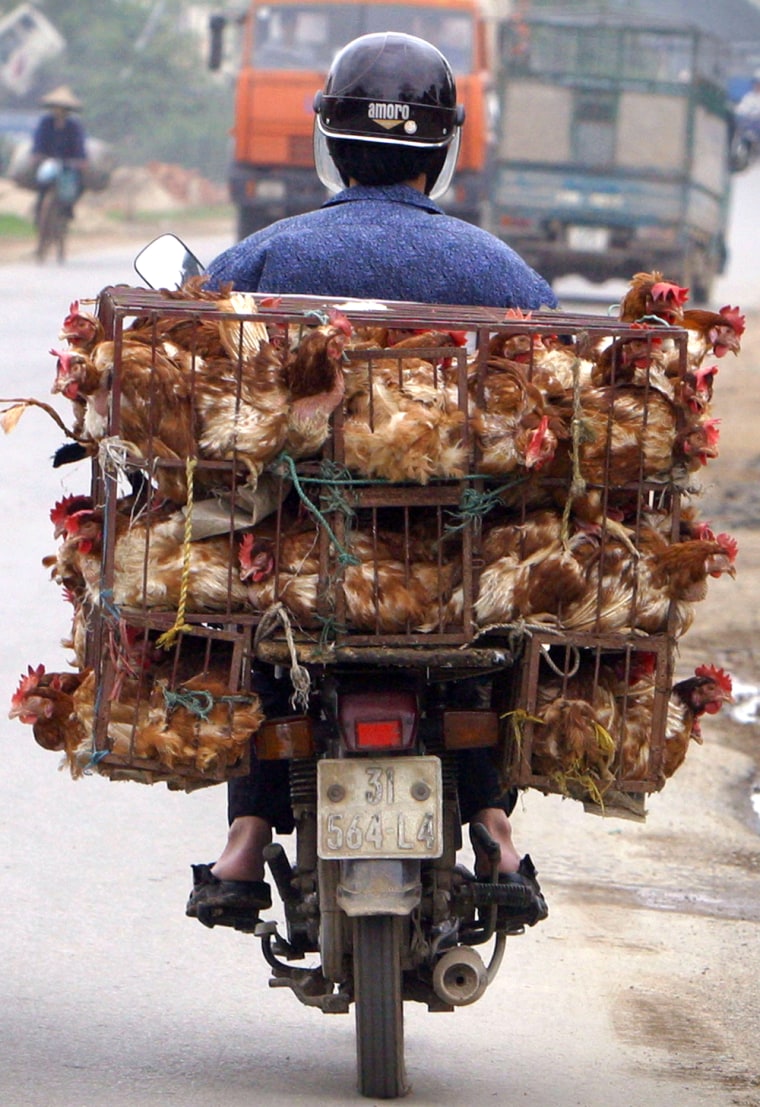In an impressive burst of action, Vietnam, once the epicenter for bird flu, has temporarily stamped out the disease: no people infected since November, and no poultry outbreaks since December.
The poor communist nation says it accomplished this feat by vaccinating millions of chickens and ducks, slaughtering millions more, by being honest with international health officials, and by educating its citizens.
There were even crackdowns on local delicacies, like duck blood pudding, believed to be the source of at least one death.
"We are actually disease-free in Vietnam for the moment," said Hans Troedsson, World Health Organization representative in Vietnam. "We're probably not virus-free, but what the mass vaccination has done is reduce the virus load in the environment — we have less virus circulating."
While Vietnam's concerted action is credited for its success, animal health experts say the vaccination campaign was likely the key. They warn, however, that immunization is not a simple solution for wiping out the H5N1 virus.
Bird flu, which doesn't spread easily to people, has killed more than 100 people since late 2003. It recently surfaced in several countries, infecting poultry in Israel, Denmark and India, to name a few.
Staying the course
"What matters is what happens from now on" in Vietnam, said U.N. Food and Agriculture Organization animal health expert Peter Roeder, who has been advising Asian countries on bird flu. Vaccination is so expensive that "you just can't keep it up," he said.
Vietnam spent $18.9 million vaccinating 120 million birds last year and plans to immunize 160 million more birds, said Hoang Van Nam, deputy director of the Department of Animal Health. Eighty percent of the poultry sampled after vaccination had enough immunity to protect against the disease and none was found to be carrying the virus.
China claims to have vaccinated all of its 14 billion domestic birds, but it has continued to see outbreaks and human infections. Last week, Shanghai logged its first human bird flu death, bringing the human toll in China to at least 11, according to WHO.
Widespread immunization requires thousands of workers who must keep the vaccine chilled and return to farms to give booster shots three or four weeks after the first inoculation. A third injection is given four months later to poultry raised up to a year. But many birds have much shorter life spans, meaning the cycle constantly starts over.
Vietnamese farmer Trinh Duy Cach knows the process well.
recently watched as three workers in surgical garb immunized a third of his 900 chickens in the family's backyard coop, a fenced-in area littered with mud, manure and a sprinkling of lime powder to help disinfect.
Hundreds of clucking, squawking black-and-white feathered birds were corralled behind a plastic tarp under a roofed section of the pen. It took the trio only an hour to finish — grabbing each chicken by the feet, holding it upside down, then releasing it — before moving on to the next farm in Ha Tay province. By noon, they had vaccinated 2,000 birds.
Cach, 73, says he feels better just knowing his main source of income — $100 a month — has been vaccinated against a disease that has killed or forced the slaughter of an estimated 200 million poultry worldwide — 45 million in Vietnam alone.
"I had all the chickens vaccinated and I also disinfect my farm every week," he said. "I have no worries anymore because this vaccine has been used for some time and it has been found to be effective."
FAO recommends slaughtering and vaccinating as effective tools to slow the virus, but no one approach can be applied universally, Roeder said.
Vietnam still on edge
Backyard farming makes up about 60 percent of Vietnam's poultry industry, while large commercial farms are most common in developed countries. Some nations, like Thailand, shy away from vaccination because they are large poultry exporters.
"You have to adapt what you're doing to the local circumstances and you have to be realistic," Roeder said. "If you've got 800 million birds, then contemplating vaccinating them all is rather difficult. If you've got 50 million, you might be able to do it."
Roeder has recommended that Vietnam start thinking about a strategy that moves away from vaccination. He said separating ducks from other poultry, limiting the number of birds in each backyard flock along with enhancing farm hygiene will help reduce the virus' spread.
Experts worry the virus will mutate into a form easily spread among humans, potentially sparking a deadly global pandemic. Most recorded human cases have been linked to contact with infected birds.
That fear keeps Vietnam on edge. Outbreaks have come and gone before, and government officials say the recent quiet should not breed complacency.
"I think our success is only temporary. We are now still worried about a recurrence of outbreaks," said Nam of Vietnam's animal health department. "Now it is too early to say that we have already controlled this disease."
